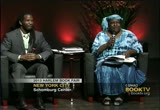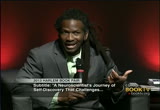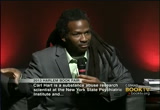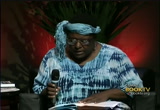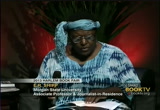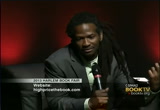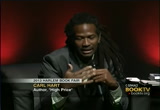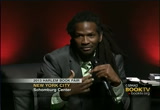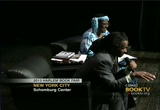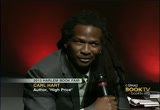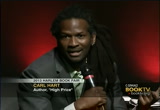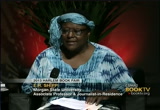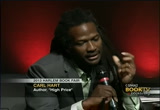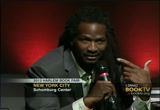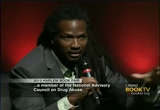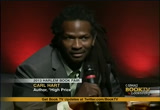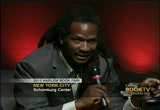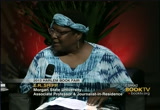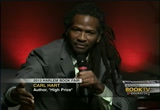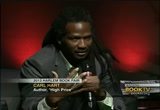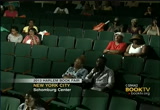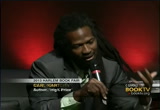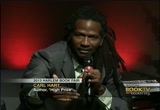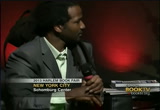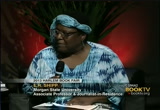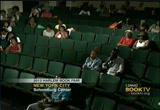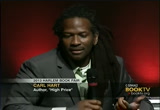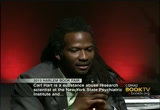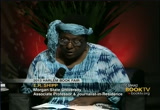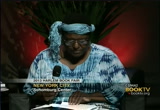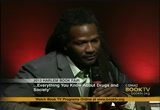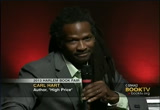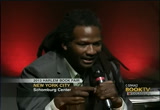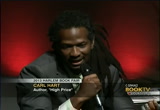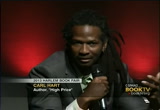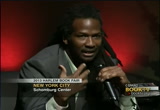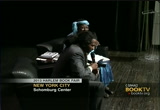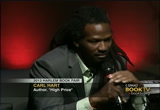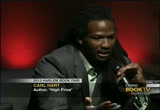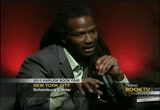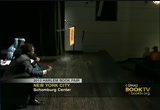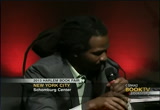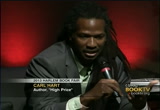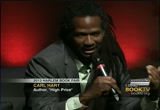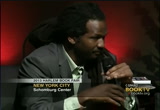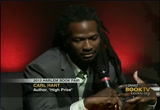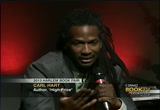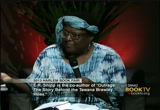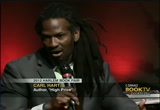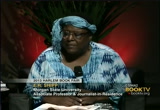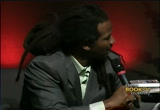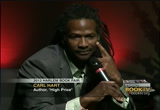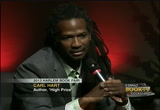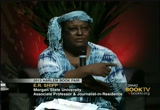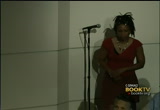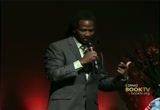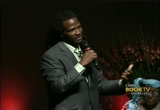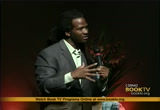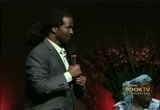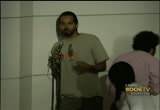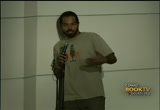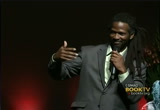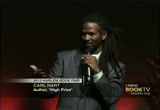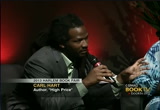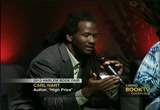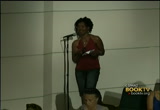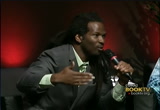tv Book TV CSPAN August 11, 2013 4:00pm-5:16pm EDT
4:00 pm
>> let us know what you're reading this summer. tweet us @booktv, post it on our facebook page or send us an e-mail at booktv@c-span.org. >> next on booktv from the 201 3 book fair, a conversation about drug laws. karl hart, author of "high price: a neuroscientist's journey of self-discovery that challenges everything you know about drugs and society." this is about an hour and 15 minutes. .. okay. is everybody hearing me? hi, how are you? dr. hart, you're laying a really heavy one on us here with this book, "high price." there's a lot i want to talk to
4:01 pm
you about. and, hopefully, raise some of the issues that people in our audience are also curious about. let me start with the title itself. what is the high price to which you refer, and who is paying that price? >> first of all, i just want to say thank you all for coming out. i know you all could be doing something on this hot day in new york. so thank you all for joining us. so "high price," what's the title? some of you all may have heard or seen some of the sort of publicity around the book. i am the first tenured african-american scientist at columbia. and when that's the case, one must pay a price. and in the book i'm saying that the price is too high. it's a hell of a toll that it takes on one, on someone, and
4:02 pm
folks who are coming up subsequently, i'm trying to show folks how we can decrease the price so we can produce other brothers and sisters who look like me if they want to become scientists. so the book is trying to describe this. that's one. two, when we think about what we're doing in this country, i study trucks, -- drugs, by the way, study drugs of abuse. and then when you think about what we're doing in the country in terms of drug policy, some of you all know if you have been living anywhere other than under a rock, you know that our drugging policy disproportionately impacts negatively black folks, particularly black men. and what i'm saying in terms of drug policy is that the price is too high for our community. so high price is a play on my personal story, on my science and on drug policy. >> well, that is one of the
4:03 pm
things i thought you were trying to get us to think about this in two ways. in many ways you say that black boys are paying a high price for what you see as misdirected drug policy. you say that these policies character blacks disproportionately and that they derive, if i understand it correctly, from in this obsession with drugs like cocaine, opiates, marijuana that are based on racist assumptions, bad science, bad policing and media hype. do i have it right? >> that's right. >> and i was struck by this passage in the book where you say, and let me find it here, um, give me one second. okay.
4:04 pm
i explain that my 20-plus years of drug research experience has taught me many important lessons, but perhaps none more important than this: drug effects are predictable. as you increase the drug dose, more potential for toxic effects. black boys and men's interaction with the police, however, are not predictable. i worried all the time about the very real possibility that my own children would be targeted by law enforcement because they fit the description of a drug user or because someone thought they were under the influence of drugs. too often in these cases the black youngster ends up dead, and you mention among them trayvon martin. what can you tell us about that? you said you would prefer to have your sons interact with drugs than with law enforcement. >> so i should give you all some
4:05 pm
background. so i've been studying drugs for 23 years now. part of my research today is that i actually bring people into the laboratory, and i administer drugs like cocaine, marijuana, methamphetamine. and i study the effects to see exactly what they do and what they don't do. of course, we pass all of the ethical requirements. now, as i point out in this passage, i've learned many important lessons. some of those lessons often conflicts with what you all have been told. the first thing that one of the things that i try and do in "high price" is to show the reader how they've been lied to. they've been lied to a range of sort of folks including the government, including scientists, including law enforcement. a number of people about drugs. and so as the passage indicates, the thing that i know about
4:06 pm
drugs is that drug effects are predictable. that means that we know when bad effects are more likely, we foe when positive effects are more likely. now, when we think about the environment that we have created, all of us, we've all participated in creating this environment. the environment that created the 100 to 1 disparity between crack cocaine and powder cocaine in cha we treat -- that we treat crack cocaine more harshly than powder cocaine. we all said that drugs were destroying our community. we all believed that. that's a lie. drugs were not destroying our community. unemployment was out of control before crack cocaine was introduced. but we all accepted the sort of easy answer, and we created this environment such that we went after crack cocaine with such intensity, such intensity that law enforcement thought that they had license to come into the community and do whatever
4:07 pm
they would to your children, to my children, to me and so forth. and so in the book i try and, plain how this all happened -- explain how this all happened and how this is currently going on. so when i say i i prefer to have of my kids interact with drugs as opposed to law enforcement, i know how to keep my kids safe with drugs. there are a number of things that we know how to do with drugs in order to decrease the harm. and i describe some of these things in the book. but i don't know how to keep our kids safe with police officers, particularly when you have these young males interacting with our young males. i don't know how to do that because the test roan and the sort of -- testosterone and the egos get out of control, and you end up with things like trayvon martin, with the kid who was killed in the bronx. , and so all of this in the name of drugs being so awful, i'm here to tell you people drugs are not the enemy.
4:08 pm
we know how to do these things safely, we know how to keep people safe with them. >> let me pick up on that point. particularly in a community such as harlem and throughout new york city and throughout urban america to say that drugs are not the problem is kind of difficult for us to swallow when we look around us. and the things we see seem to be associated with the use of drugs, the abuse of drugs. so tell me more about why we shouldn't be so upset about drugs as a problem. >> well, i want to make sure that i'm clear and i'm not trying to be reckless here because i'm not reckless. you don't get to be in my position and be be reckless, that just doesn't happen. particularly looking like i look. you don't get to be reckless. [laughter] prison -- [applause] >> so what i mean when i say that drugs are not the problem, i mean that -- let me give you some thattist you cans.
4:09 pm
when we think about drugs like cocaine, 80, 90% be of the people who used cocaine including crack cocaine, 80, 90% of them don't have a problem. they go to work. they go to work, they pay their taxes, they are responsible individuals. same is true for other drugs. but you do have a small percentage who have problems, 10, 20%. and that should be taken seriously. but if the vast majority of the folks don't have a problem, that tells you that it's not the pharmacology of the drug, it's some other things. and those other things, we know what they are. lack of skills, lack of jobs, a wide range of things that, you know, we try to work on in the 1960s and '70s, the great society. the things that the society has abandoned. all of those things. that's why i tell my perm story
4:10 pm
so you -- personal story so you all could know that i'm not perfect. lord knows i'm not perfect. i sold drugs, i did drugs, i did all of those sorts of things. not as a badge of honor. i'm not saying this as something to be proud of. i'm saying this so that you all know that i made mistakes, and i have done okay in this society. i pay taxes. in fact, the guy in the white house has done marijuana, has done cocaine. the guy before him, george bush, done marijuana, widely suspected of doing cocaine. the guy before him, bill clinton did marijuana. >> he didn't inhale. >> no, no, no, he said he didn't inhale. [laughter] he said he didn't inhale. but the point is that those guys are more typical of drug users than what you have been told and what you think. and that's not to say that people don't have problems, because there are people who have problems, and that's a small percentage. and we know how to deal with those problems. and the way we deal with the
4:11 pm
problem is not our current drug policy, because our current drug policy ends up with too many of our folks in jail. >> i'm going to pick up on that again, but i wanted to stay with trayvon for a minute because we know that even outside here on these streets today there are all kinds of protests all over the country reacting to the verdict of acquittal in the george zimmerman case a week ago. thousands of people are apparently protesting, and on the eve of that protest yesterday gave an emotional speech where he said he could have been trayvon. and he talked about the difficulties of being a black male. he offered some sense of solution, but i'd like to ask you, dr. hart, what do you think
4:12 pm
of what he said about identifying the problems that black males have but more importantly, the solutions he hinted at? >> well, i have to be really careful here because there are a hot of people -- a lot of people who support the president who i want to buy this book -- [laughter] now, on the one hand i think the president deserves props for coming out and saying something. he must be under tremendous pressure from both sides. and so i appreciate the pressures under which he, which he has to deal. on the other hand, one of the things that -- i listened to the speak carefully, and he gave evidence of the racial discrimination, two pieces of evidence he gave.
4:13 pm
the december proportionate -- disproportionate number of brothers and sisters in the system, criminal justice system, and the disproportionate numbers of people who are being arrested for drugs. if you look around the country, black people are four, seven, eight times more likely to be arrested for marijuana even though they don't use marijuana more than white folks. we look at the crack cocaine, powder cocaine disparities, we know that 85, 90% of the people who are arrested for crack cocaine and prosecuted are black even though they don't use crack cocaine at rates higher than white folks. so the pieces of evidence that the president gave for racial discrimination is supported by a plethora of data. yet now i want to say that i understand that he hasn't thought this through completely,
4:14 pm
but there was no sort of comment on drug policy and proposed solutions. in "high price" i propose what the country could do to deal with this issue of the high numbers of black boys and men being arrested. and by the way, if you're arrested, you get a drug felony and so forth, the likelihood of you getting a job is, it's very low. so one way to deal with this jobs situation or the, this impediment is that you stop giving them this blemish. and in "high price" i argue that we should decriminalize all drugs. now, decriminalization is not legalization. decriminalization drugs still remain illegal. legalization is what we're doing with, oh, alcohol. i'm not proposing that. because with decriminalization if you sell drugs, you still are subjected to the same penalties
4:15 pm
as you were before. but given that 80% or more of our arrests for drugs in this country are for possession, i'm arguing that when people are caught with possessing drugs, they get the equivalent of a traffic violation. and not a criminal offense. this isn't new. we already do it in some states with marijuana. this isn't new. portugal has decriminalized all drugs. they have done it since 2001. it works. so i was disappointed at some point, some level that there was no comment on drug policy when we know drug policy is the reason why these folks are caught up in the criminal justice system in the first place. >> well, the president said that he wants to find a way to show black young men and boys that
4:16 pm
they are valued in this society. how can he do that? >> now, i didn't want write on this subject -- i didn't write on this subject, i should tell you, in terms of the way the president can do that. one of the things that the president did, and this is important, the president corroborated the reality of black boys and men by telling the stories of him walking down the street or in the elevators and women clutching their purse, or you're walking down the street, and you hear cars clicking their locks and so forth. of course, we all have that experience. that's a small slice. i think that it requires more, particularly when we think about the things that really matter in this country. if you want to validate black boys and black men, make sure
4:17 pm
that they can support be their family, make sure that they have jobs, make sure that they feel like men. that's the most important way to validate someone. i mean, when you have mediocre white boys working -- and they should be, by the way -- but you have to be extraordinary to be a black boy, black man, something's wrong. and this is what we need some comment, we need some action on. >> well, these days you get around in pretty rarefied academic circles and some policy circles. but i think our audience might like to hear a little bit more of something that you alluded to earlier. you clearly did not grow up as a cosby kid with claire and cliff huxtable as your parents. you grew up in south florida. tell us about your rocky start in life and what it was that put
4:18 pm
you on a course to get to where you are now. >> so as i said, this book is a combination between a memoir, science book and a policy book. i told the memoir portion because, not because i want you all to know more about my personal business. believe me, the great deal that i revealed in this book caused me a great deal of anxiety. i didn't tell it for that reason. i told the personal part because i know people learn by example. but i have to add science so you don't make the mistake, because you can make some real mistakes by anecdotes. i know people make mistakes, and i wanted the cast of kids who were coming up after me to see how, to provide a road map, if you would, how to do this. i wanted policymakers to see a road map, how you do this with people who were not cosbys. so the thing that kept me
4:19 pm
plugged in, into society even though i was engaged in petty crimes and that sort of thing, the thing that kept me plugged in was basketball, high school basketball. i played high school basketball throughout. i had to maintain a certain gpa, a 2.0 to stay in school. i did, and i also -- it allowed me to graduate. i had five sisters, i had a grandmother who was strong. they kept me on the path that was as straight as possible even though i deviated. but i didn't want to disappoint them too much. i had a guidance counselor when i didn't get a basketball scholarship who had me speak with the military. i went -- i ultimately went into the air force where i began my college education and where i began to get a real education because i left this country. i had to go over to england in order to have my experience here with racism and my experience as a black man be with corroborated.
4:20 pm
so i learned how to develop a critical analysis of this country by being over in england. i had mentors, multiple mentors. i mean, i had mentors in the streets, and i had mentors also in the classroom, a wide range of mentors. this notion that you have only one mentor, that's crazy. i had multiple mentors. i had drug dealers who were mentors, i had professors who were mentors, a wide range of mentors. and i took from each what i needed. in fact, one of those mentors told me that i had what it takes to get a ph.d. and so that's how i ended up going to graduate school. [applause] granted, i didn't go to graduate school in harlem, i went to graduate school in wyoming. [laughter] and that's a story. [laughter] that's another story. i talk about that story.
4:21 pm
>> you said that you had an abundance of adolescent cockiness that created risk blindness. i think a lot of participants can understand that -- parents can understand that and know that when they think of their own sons in particular. why is it important, do you think, for readers to know that your bad acts, quote, had nothing to do with drugs and everything to do with street credibility? >> so one of the things we have to ask ourselves is that if the drug policy isn't working for us, well, why is it, why does it continue to persist? why do we continue to have this bad drug policy? drug policy add it is today -- as it is today and our myths about drugs actually works for politicians because when you go to your politicians with a problem, the only thing they can do really is pass the law or something of that nature.
4:22 pm
and if you know or you think the problem is drugs, you can pass laws that restrict drugs, you can increase the number of police officers. that's easy to do. and so you don't have to look at any further, you don't have to look any further for any of the answers. now, the reason why i point this out in the book is that drugs were not the problem is because i didn't want people to stop and think that they had the solution. drugs are easy scapegoats, and they are rarely the problem. i wanted folks to understand what the issues are tar going on with young -- that are going on with young people whether they are coming up in my era or whether they're coming up in the current era. i mean, there is -- i, too, had, i needed the approval of my peers. and so as a result, i engaged in
4:23 pm
some behaviors that were not productive and certainly could have gotten me in trouble. but they had nothing to do with drugs. they had everything to do with risk taking that adolescents do. so as a society if we can keep adolescents safe by making sure that the activities in which they engage in, these risk-taking activities, we can decrease the harm as much as possible and understand that the risk taking is normal be. and it's not some extreme aberrant behavior. so i try and show how all of these sort of things that i was doing, they were normal in the context. and if we understand the context, we might be able to keep people even more safe. >> so that argues, i suppose, for more proactive involvement in our student, in our young people's lives, the grown-ups in the communities need to do more,
4:24 pm
not wait for law enforcement to be the answer to whatever it is our children are doing. we need to provide some alternatives for them. >> yeah. so if you ever wait for law enforcement to serve, to solve your problem, you have already lost. law enforcement has no training in pharmacology to talk about drugs, no training in behavioral science. their training is to go at the criminals and lock them up. >> and sometimes there are presumptions about those people they're locking up based on this notion that black people in particular are more likely to be involved in drugs and other crimes. so jump on them before they have a chance to act seems to sometimes be it. let me point out one of your experiences. you earned your ph.d. in neuroscience in 1996, and you
4:25 pm
athat year you were the -- you say that year you were the only black male in this country to earn that degree. you went to the national institutes of health to do some research. tell us about that experience you had where you came face to face with assumptions that were made about you as a black male? >> you're describing an experience that i had in which i was subjected to an impromptu lineup. now, we all have these kind of experiences, and i am, i'm kind of reluctant to even talk about it publicly. these kinds of things, because you all could tell me your stories. but this particular story i was going, i was on the nih campus, national institute of health campus. it is the premier medical campus in the country. i was doing research for my dissertation, my ph.d. dissertation, and at the time i
4:26 pm
was so excited about some finding that i was getting in the lab. i had just come back from the bank, one of the bank buildings -- one building contained the bank, and my building was near the bank, and so i was walking towards my building. and two police officers, they were undercover police officers, were staring at me, and one black and one filipino. and i could not figure out why they were staring at me, and so i thought, well, maybe, you know, they're interested in me romantically. [laughter] but that wasn't it. and they said that, well, there's been a robbery, can you help us out? and then me being oh, of course, absolutely, man, what can i do? and so i agreed to help 'em out x. they said, well, the perp who
4:27 pm
did the robbery -- the person who did the robbery was wearing or looked like you. we thought -- so -- and now i'm shocked. i had my name tag on, my badge and bank statement and so forth. and so they asked if i'd mind being subjected to an impromptu lineup where the person who was robbed could point me out or identify me or exonerate me. and so i, i didn't see that i had a choice, so i did. and then about 20 minutes later they told me i could go. but being a psychologist, i know too how unreliable lineups are. and so afterwards i was really angry about this thing. but not knowing what to do, i was in training, i was trying to get my ph.d., i was trying to keep my nose clean, i was trying not to be involved in any sort
4:28 pm
of controversial acts or -- so in the end i ended up doing nothing. but those kind of things happen. and i have many more stories i didn't share in the book because i didn't want to bore the reader because you all know these stories, but that's why. >> well, you ended the chapter which you call requested "still just a nigger." it infuriated me. but that's when i realized my son would soon face a world where even in the most clear cut situation someone with our skin tone could still be seen as a crackhead just because he dressed a certain way or to use the language of an earlier wave of drug hysteria, a negro cocaine fiend. ..
4:29 pm
and people with whom they were interacting and drug policy formulation with the same kinds of people that were relying upon to formulate these policies and they are having the same kind of attitude that could see u.s. potentially the bank robber and wanting you to go through a lineup. it is unsettling to think that people may have those attitude, who are the very same people. first of all, doing the research on which policies have been based. it is scary. >> well, it is scary, but i hope it's not a revelation to anyone. if it is, you are in trouble in this country. one of the reasons i wrote high
4:30 pm
price -- "high price" was because voices like mine are not in the discussion on drug policy. when i say voices like mine, very few people in the country with the experience with drugs as i do. but in science, first of all, there aren't many people in my science who look like me and certainly not with the experience i have. scientists in general are conservative people. they don't speak out on these issues. they don't speak out on these issues for a wide range of reason. number one, their children, because they are white about what the subject it to the same sort of things that my kids will be. that is one. two, if we continue our current approach with drugs, the notion, guided by this notion that drugs
4:31 pm
are so awful, it hopes to increase her budget in science. and so, that provides further motivation for them not to speak out. and so, in this book i describe the science about how you have been misled and i also described his personal sort of story. and so, i really hope that the people read the book carefully. and if you do that and we have this movement, i think that things will change, but the change will come from you, not scientists. when we had slavery, i don't get the slaveowners were the ones who are saying we need to get rid of slavery. it is the same situation, folks. >> you said sometimes the most important discoveries come from
4:32 pm
questioning seemingly axiomatic assumptions. when did you begin to question conventional wisdom about crack and its impact? >> so, in 1996, i was in the university of wyoming library, doing some sort of research, trying to prepare for my dissertation. i came across an article written in the teen 14 in "the new york times." it was called fiends or a new southern menace. in this article, this article had has been cited by a current scientific paper. in this article, the author described how it made black people unaffected by bullets so you had to increase -- they were unaffected by 32 caliber bullets, so you you the caliber of your bullets to the 38 caliber bullet if he wanted to stop a black user.
4:33 pm
cocaine also made better marksman so they could shoot better. that's bad when sub 10 made them more murderous as the author stated. as i read articles like this more carefully and i looked at what we had been saying about crack cocaine in the mid-1980s and early 1990s, it was the same thing. we were saying exactly the same thing except the language had been 10 heard. so i started to think more critically, started to read in a way that would challenge some of the assumptions the authors for making. i learnt the vast majority of the people who use all of these drugs don't have a problem yet we act like the drugs are the
4:34 pm
problem. i learned that if you provide people laboratory animals with alternatives to the drug, they almost always take the alternative as opposed to the drug. that told me the drug was not so powerfully at it being. i learned that many of the effects when we think about the cognitive effects of the brain affected these drugs, i learned that many of the claims that are made in the authors discussions conclusions are inconsistent with the actual data that they just published. and so, as i started to think about these things more critically, now i try to think about my life in the same way. i try to think about the people i care about in the same way. so i hope "high price" will be a way for people to think
4:35 pm
critically is both. >> one image that still sticks with me. back in the day when crack was the madness, we were told, we had hell house here at harlem. it was the thing for prominent people, celebrities to be seen going to hold a crack baby. we were being told or community was devastated by a crack in a whole generation of children were being destroyed by a crack appeared in your book, you seem to say that was one of those myths. can you explain that? >> i'm not the one that says that's a myth. all the evidence shows that smith. even "the new york times" has published two major pieces, one of them titled the epidemic that wasn't. the notion of this crack baby thing is not supported by any evidence. if you look at scientific
4:36 pm
literature are people saying it is, they are not credible. so that's pretty clear. i want to say that -- i am not saying that pregnant mothers should go out and use crack cocaine. i am not saying that at all. the effects that we thought was from using cocaine during the were comparable to the effects of a mother who smoke tobacco cigarettes. that's what i'm saying. when you look at the data, they look the same. when will it the long-term effects on these children, they are here. very you, they are here. we got all of these dire warnings about our schools woodinville to handle the cognitive and parents were going to see from these predators being born. none of that came to bear. but this is what we were told. so that is one of the myths that
4:37 pm
helped drive the creation of the policy that punishes crack cocaine 100 times more harshly than powder cocaine. one of the myths that has contributed to the large incarceration rate for black men and this can treat. and "high price," i am trying to help us understand how we can change that. the >> he is not only her own experiences, but those of your family members and friends to make these points you make now. let's talk about some of the suggestions you have because i think that is where some people take issue with you. i'm trying to be nice. you are advocating that we have education about drugs.
4:38 pm
and for some people, they had the same reaction as when you talk about educating kids in school about sex, that you are promoting sex. before we get into the specifics, how'd you get into the mindset that says you can't educate about drugs. you put people in jail, but she can't educate people about drugs. first of all, i'd like to say, you know, i am a person who has no time for disingenuous people and people. [applause] if you are ignorant, that is okay. but if you are obstinately ignorant, i have no time for you. so my conversation is for people who are genuinely concerned about the problem which we face. to answer the question, highly
4:39 pm
deal with earthquakes first of all, i have to have people understand that we think about drugs. particularly the legal drugs or anything else. when we look at illegal drugs, they are the same drugs for use in medicine to treat various conditions. think about methamphetamine. it's exactly the same truck as adderall, the drug were used to treat attention deficit disorder. so that tells the thinking person that these drugs can be used safely under some conditions. so we think about. it's the same druggist martín. what is working to help people in chronic pain. so now you have engaged a person under the full under which they can understand and hopefully they are open. so now you can make some progress. we can talk about specifics for each drug. we can tell people okay, if young people for example are
4:40 pm
using nirvana and of course we don't want people to engage in behaviors that are legal, but let's just say that we know and we know that people engage in behaviors they sometimes should not engage for the engage in illegal behavior. just like when we have the speeding limit in our cars. people exceed the speed limit even though it's dangerous, but we try and keep them safe by asking people to put on your seatbelt to mature into a number of things. we can do the same thing with drugs like marijuana, cocaine, amphetamines. and in "high price," i delineate the things that we can do. like alcohol we have a considerable amount of information about how to keep people safe with alcohol. we can do this with cocaine. in fact, you don't need me to do this. people are doing it.
4:41 pm
if you do 80%, 90% of the people using these drugs without a problem, they are already doing it. but i am proposing that we have this education be even better and more widely available and we can decrease even more potential harms. >> when did you begin this education? >> if you're a student at columbia and you take my classic at this education. our era of fear in my household you get this education from the time you are able to walk and talk. siliceous like any other education. drugs are not special in my household. the main focus in my household is that my children are good to have -- expected to achieve a certain amount of success in
4:42 pm
life. they are expected to go to college, expected to do these things. not anything that impedes or disrupts their ability to do that, we have a problem. whether it's driving the car too fast, whether it is playing videogames, whether it is smoking marijuana. so this particular education is not limited to marijuana or some drug. it encompasses everything. so anything that disrupts their ability to succeed where their ability to achieve the expectations that we have. we have to talk about it and provide education. it is no longer disrupting their ability to do that. >> first you want to educate inexperienced drug users so they know how to use the proper amount of drugs. >> that's right.
4:43 pm
i told the story. i just got gotten out of the military in which i hadn't smoked marijuana in a while. i met two women. you always get in trouble with women. no, i'm joking. that's a joke. actually, in the book, the main point is the women in my life kept me out of trouble. but in this particular case, we were smoking marijuana and i was naïve and i tried to be macho and i smiled too much. i got really paranoid and had a bad experience. now, if i had the proper amount of education. i was in annex. steve's there. be an inexperienced user i should not have been behaving like i was experienced and had
4:44 pm
tolerance. i should've started out with extremely low doses that only taken a small amount. i didn't say this, but i did not know these women particularly well. i should've also not smoked with people i didn't know well because i had all of these suspicions about their motivations, which were not true, but i had these suspicions. all of these chairs contributed to having the bad experience. in the book, i am explaining inexperienced users should start with low doses. also, don't take these illegal substances and environments in which you are comfortable or with people with whom you are uncomfortable. so there are some part of things played out. >> i am trying envision this, having this practical conversation about how to modulate your level of drunken
4:45 pm
take. it wouldn't work in my household. >> he said it wouldn't work in your household? i don't know. this is beyond drugs. this is where parenting -- people have to actually parent. you have to be able to talk to your children about other potential things they will face in life. this is one of which you are not able to talk to them about, that says more about your relationship with your children more so than about drugs. this is not about drugs. if you can't talk about drugs, maybe you cannot talk about sex. maybe you can't do a number of things. so i would encourage people to be better parents. >> i encourage that part, too. the second thing you suggest is helping people to prepare their
4:46 pm
bodies in a way. b.c. healthy sleep habits should be stressed for all drug users. why do we want them to sleep well? >> well, one of the things i know from having a position in the medical school is there are a few things we can do to increase their productivity and health, longevity. sleep well, eat well, exercise and also laugh. if you do those things come to you on the path to having a more healthy life. in this particular incident you are describing, i'm talking mainly about the means. one of the things that amaze do, methamphetamines, after all, on the strength of drug stimulants keep people awake when they should sleeping. so i encourage -- i urge amphetamine users to make sure that if they are using the drug, don't use it in your sleep time and make sure they get the proper amount of sleep because
4:47 pm
chronic sleep loss is associated with things like psychopathology, various medical conditions like certain types of cancers, a wide range of deleterious effects on health. so i am encouraging folks to take stimulants, drugs that keep you awake, make sure you get your sleep. that's just common sense. >> in the third thing you advocate is educating people about the combination of drugs. certain drug combinations should be avoided. now we are going to focus on combinations of drugs that should be avoided. >> some of you may have been paying attention. the actor from "glee," he died earlier this week. actually, i think he died last
4:48 pm
week, but the autopsy report came out this week. he died from a combination of hair when alcohol. too often in our country, one of the things we do is we vilify. one of the things i learned in my education is the vast majority of people who died from heroine, 75% or more combine that with something else that is usually alcohol. three quarters are dying from this combination, not heroine alone. heroine alone is possible but it's rare. given that is the case, i am encouraging people if you are going to use heroine, please avoid combining it with another sedative like alcohol because that increases the likelihood of you having respiratory depression and dying.
4:49 pm
and so, it seems to make sense, given that the overwhelming majority die from this combination can not heroine alone. our focus should not be a heroine. our focus should be on -- when it's that we're missing this important public health education opportunity. >> the way the stories going out with the actor is that heroine is bad and it should be avoided and there is no cure or am not talking about how to use heroine was found a mouse. there is an article in the times yesterday about heroin is in new england. >> i want to say something about this issue of heroin should be avoided. exceeding the speed limit should be avoided. having unprotected that the
4:50 pm
people you don't know should be avoided. a wide range of behavior should be avoided. each year, hundreds of thousands of people use heroin. these numbers have been this way for multiple decades. the point is heroin use is not going away. that's a fact. even if you don't use it or understand why people will use the drug, it not going away. given that it's not going away like exceeding the speed limit is not going away, just like premarital sex is not going away, given that it is not going away means being a scientist concerned with how thin the sort of things, my question is how do you keep people safe? my goal is to reduce the harms associated with heroin use. >> i hear you, but i also hear those from the corners literally saying no, no, no.
4:51 pm
you quote from a former professor and mentor who said what you know, you cannot not know. but many say they were secured in my life when i was unaware of the forces prevent teen tobias, your son, and people like ken from legitimately compete even in mainstream society. that time is past. i have come to understand that the game is fixed against them. now in your advocacy against current drug policy and hoping to move us towards better job policy and to look at some societal issues more broadly, what specifically are you doing now to get more people to come around to your views on the use of drugs in our society and the laws we have to regulate use of those drugs?
4:52 pm
>> well, i just want to address the issue of the game is fixed briefly because some people might want to know some comment on that. when i say the game is fixed, there are people in the country who say that the disproportionate numbers of black people arrested because of drugs is not about race. this is not about race. these are the same people who say that the killing of trade by martin was not about race. so when people are saying that these things are not about race, it is shaping the game. it is shaping a conversation, limiting the conversation. it is not allowing us to put all of the card on the table. so the game is fixed and that
4:53 pm
you cannot even talk about race in 2013 when we all know it is about race. when we think about the drug policy and so forth, it is clearly about race. that's why when you ask what i'm doing, i wrote this book i don't usually communicate with the public. in part because you have to be in my position and the world in which i live and work. you have to be more diplomatic than i know how to be. so it's easier not to communicate with the public because i don't know how to do this thing, where people are not fully disclosing what the situation is on a day that's telling them what the situation is. so my attempt here to
4:54 pm
communicate with the public with "high price" is a huge effort on my part because i don't try to offend people and i don't want to offend people, but i have no time for obstinately ignorant people. people get offended and i don't mean to offend people. so high price is a step in the right direction and it is an attempt for me to communicate with the general public. in "high price," i laid out a program, some policy recommendations that i saying will be beneficial and i think they are evidence-based and they certainly will lessen -- they
4:55 pm
will certainly lessen the racial disparities we see in our criminal justice system. but i am not sure if the country is serious about decreasing racial. he. i have no time for people engaging in this conversation when they are not serious. >> well, i think -- [applause] okay, we have a lot to think about from dr. hart. cannot we will let you who have had a chance to think some questions you you have of him. the microphone is here to my left. can you make your way to the microphone?
4:56 pm
>> readings. i apologize that i came in late. >> it's okay. >> i was out there doing a reading. i also apologize i haven't read the book. i read about it. my question because i came in when you were saying it wasn't about the drugs. you're familiar with dr. gaber bazzi? my question is you know that he seeks addiction, adult addiction and very severe early trauma. i'm going to read the book. it is your research running counter to his philosophy and his work were just a you could share a little bit about that? his book in the realm of hungry ghosts, which i recommend. >> now, you have to understand he has a narrow perspective. that is not an insult. i appreciate that the brother is doing.
4:57 pm
he's trying to change the discussion, which is good. he focuses only on people who have a problem with drugs. so that is a narrow percentage. the vast majority of people don't have a problem. so he is talking about his narrow clinical population. and so, it is not really relevant -- my entries is an 80% to 90% of people who don't have a problem. the brothers and sisters being arrested, that is my interest. i appreciate the fact that he's asking folks to think about the trauma that these people are subject to two. i applaud his effort. [inaudible] >> the question was i don't disagree that early severe trauma can lead to addiction. if you're only focused on addiction as a result of early
4:58 pm
trauma, you're probably too narrow. they're a wide range of problems that could be to an addiction is just one. >> next question. >> i work a little bit with the peer network of new york. the majority of home do not have science degrees and that kind of formal education. i would like to ask you what is your opinion? what is the most effective way to incorporate peers around drug policy and straight education around drug use. i particularly work with crack inside 10. like you said, talking about crack. i mean, it's great for, but my question specifically is working with the peer network of users and ask users and having a conversation on the legitimate level that you have are having a
4:59 pm
published book. >> so i just want to be clear. you are talking about the folks who are trying to help people using drugs, am i right? so i guess with any sort of buffer, you want to make sure that the people who are disseminating the knowledge are actually knowledgeable. in this field, there's a number of people engage in conversations about drugs and they know very little about drugs. so if for example i've used drugs. let's say someone is used drugs, now qualified to tell you about drugs. no, that is not true. so i guess people who have drug addictions are also some of the folks who then most resistant to many nested. because i'm the one hand when you think about it, first of all on the one hand you've think
5:00 pm
about the folks who're addicted or it had addictions. one of the things that addictions to is they serve, particularly people who love overcome addictions, they serve as badges of honor. this was so awful, crack, heroin, whatever it is. i am so strong that i overcame it. now i'm trying to take away this badge of honor. i am saying probably not. so you can see how they can be resistant. some, not all. i am asking you to make sure that people actually are educated about drugs. not only have their personal experience, but know something about the effects of drugs, that they really know a wide range of information about drugs. >> quickly, i think point was more like how to to demise
5:01 pm
without any kind of formal scientific, academic background. a lot of criticism we get in our work is we're working working with the peer network, but have you kids appears the platform to take over to talk about drug policy? >> again, you actually have to know something about drugs. you can't get around that. understanding it is hard for people to shut you out if people know what you are talking about and that is the basic sort of thing. some people say my sincerity or my credentials, not good enough. >> i have two questions. the first is imac counting bachelor program and i was told drugs have a different effect on different people and so what
5:02 pm
might be hard for one person might unlock cycles and another person. how do you feel about that? my second question is even within your safe limits we are conditioned to believe some drugs have an effect on our cognitive abilities. i you saying using it as you prescribe for those who choose to use it won't have additional cognitive decline beyond what is necessary for aging or genetics? >> drugs have a different effect on different people. how many people here drink alcohol? does alcohol different -- have a different effect on these people? of course it does. it has a different effect on me under different conditions. that is not unique to any drug. >> with regard to mental health for people who might be predisposition toward a mental illness, you might smoke weed and nothing happens. you don't know what. you are not predisposed to
5:03 pm
mental illness, you drink we a lot, you will never be the same. that is what we were taught and wondering what you think. >> we think about the information, the issue is related to people being more susceptible to psychosis or what have you because of their background, their genetic background. i wouldn't recommend that people who have a family history of schizophrenia for example smoke weed or take amphetamines. i would not recommend that. if you know you have mental health issues, you don't want to do anything that might put you in any kind of harm's way. that is also kind of common sense. it is also part of the education. >> what about the people you don't know? they are underdiagnosed. if you don't think you have a family history -- >> you are asking me to solve
5:04 pm
the clash problem of the country. ignorance, there are a number of people who don't know a number of things and they have negative health consequences as a result. the same is true here. if you don't know and you engage in this behavior you are more likely to have if you don't know you have a greater risk for breast cancer or whenever, i can't solve that problem. if you don't know, i don't know. >> a couple things you said. the first was eighty% to 90% of people who paid taxes, and you want them to legitimately compete in mainstream society, do you feel mainstream society is legitimate?
5:05 pm
the act of paying taxes that go to war and everything but than mainstream society is the goal and it is not social transformation how do we take efforts in new york with the lincoln clinic trying to use acupuncture as a way to get people off of drugs and transform society. in general, what do you propose, excuse me, can i respectfully not -- what do you propose -- what is your view on this society? is it legitimate such that if you use drugs and still have a job and go to work and use fossil fuels, that is cool? or as black people should be focused on transforming the society such that these drugs wind be needed to be used as escape mechanisms like my church
5:06 pm
-- i am asking. >> first of all, i don't exactly know what you asked. i am trying to respect the question. one of the most important questions you asked is do i consider this the legitimate society. that was an important question. >> paying taxes and going on and drugs by 80% or 90% are okay, that is what we are aiming for as people. and in this society, that need to escape. >> right on. number one, do i consider this legitimate society? it is. it is the mainstream. obviously there are other ways of doing things and that is cool if they become more prominent or
5:07 pm
more prevalent they become legitimate. i have no problem with that. your point is what about encouraging people to change the legitimate society as it is today? we have problems with it. i agree. but again, i am not the best person to talk about how to change society because my expertise are on drugs and there are a lot more smart people than me on that subject. the final thing was related to people using drugs to escape. that is a myth. people use drugs for a variety of reasons, but they have some important functions. for example there are people in here who will go have a glass of wine and do a wide range of things and do so because it during 3 -- it decreases anxiety, makes the people around you more interesting.
5:08 pm
people use drugs for the same way -- they have important functions. it is not escape sort of thing, is half ology, 10% to 20%. the 80% to 90% understand why they're using these drugs under the specific conditions, because they work under these specific conditions. thank you. >> i have a really quick question. >> i have to sit down. is that it? i am trying to make this interesting. >> this is a really quick question. you said a couple times drugs are not the problem. when you consider that prescription drugs are a problem
5:09 pm
in this society, consider it may even be bigger problem than the illegal drugs, you consider an addiction is an addiction, sugar is an addiction, sugar is the huge addiction in this society that contributes to the overall diabetes. would you consider these drugs a problem and in fact maybe even a larger problem than the drugs you are focusing on? >> one of the things i want to be careful and careful not to do it "high price" is vilified a group of drugs or other drug while i am trying to show these other drugs are not so bad. drugs are schools. they can be used improperly and misused and certainly with some of the prescription medications some are overprescribed and become a problem, that is a fact but again, there are people
5:10 pm
benefited immensely from treatment with some of these drugs so one of the things we have done in this society is starting to vilify prescription pain pills. there are odd number of people, millions of people who are experiencing chronic pain who will have access to certain drugs limited because our vilification of prescription drugs, and i don't want to do that either. there are irresponsible physicians out there who are overprescribing. i absolutely agree but the vast majority of them are responsible for the most part. and so when we say whether drugs are good or bad or illegal or not, drugs are not either. drugs are not good or bad. we know how to increase potential beneficial effects and decrease potential negative affects and they are useful
5:11 pm
tools just like the automobile. the automobile, some people are reckless and get in trouble with it but we wouldn't say cars are bad. >> you are a narrow scientist, correct? >> correct. >> i know you described it in the beginning. can you describe it to me again? what your purpose is in what you are trying to to do. >> what is my purpose? >> in ten words or less. >> what i do is i study the effect of drugs on the brain and on behavior. i want to know what drugs do and what drugs don't do in the body. does that help you at all? >> to what end? nd levi ey cut you off.
quote
5:12 pm
all right. >> hello, carl hart. i commend you regarding the book. i myself am an educator so i want to buy that book. i want to ask something interesting about, it is like sex,
5:13 pm
qualified until you read this book to when it is age appropriate to tell your kids about drugs on many levels? >> i think teenagers on up, it is appropriate for teenagers on a band of course adults. the problem in the country is our drug education in this country is at the high-level of a sixth grader, and eleven-year-old or 12-year-old. i am trying to increase
5:14 pm
reading the book where else can they go to get information so they can start telling their kids at a young age? or an appropriate? >> that is a difficult one. the country's education in terms of the drugs is that the adolescent level. "high price" is trying to have a more adult conversation so "high price" is the absolute requirement. >> another question. do you see yourself, i know you are incorporating this within your course, is that what you are doing? >> i don't use "high price" in my course because i have another textbook which i use for my course. that book is more draw, more academic and it costs four times more than "high price". time for someone else. >> thank you. thank you all for coming.
5:15 pm
>> final question? >> em man has a question. >> i want to say how much i appreciate the book, i appreciate you, i appreciate your commitment to bring in your expertise to bear. there is a lot of anxiety, ambivalence about this to me as indicative of the deeply rooted myths that operate in our society. they have been destructive in society that have nothing to do with knowledge or facts and everything to do with prejudice and fear. much of the continent of actor got -- africa are under painful misapprehensions about sex and the transmission of aids and millions of people die because they refuse to understand what is necessary to treat or prevent the transmission of hiv and i hate to think that in this day we want to not appreciate,
70 Views
IN COLLECTIONS
CSPAN2 Television Archive
Television Archive  Television Archive News Search Service
Television Archive News Search Service 
Uploaded by TV Archive on

 Live Music Archive
Live Music Archive Librivox Free Audio
Librivox Free Audio Metropolitan Museum
Metropolitan Museum Cleveland Museum of Art
Cleveland Museum of Art Internet Arcade
Internet Arcade Console Living Room
Console Living Room Books to Borrow
Books to Borrow Open Library
Open Library TV News
TV News Understanding 9/11
Understanding 9/11
